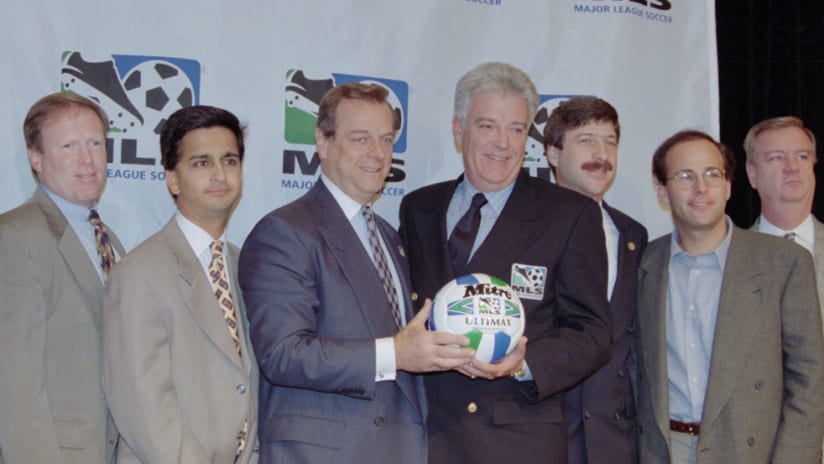EDITOR'S NOTE: This piece originally ran on April 6, 2016.
APRIL 6, 1996. Perhaps that's not a date etched into American sports lore, but for many of the players and coaches that took the field at Spartan Stadium on that day, it meant everything to the careers they had carved out and the legacies that they were trying to build in a country that had never fully embraced their sport.
Twenty years ago, two teams that had never before played a competitive match, the San Jose Clash and D.C. United, met in San Jose, Calif., for the inaugural match of a nascent league, Major League Soccer, that many in attendance weren't sure would be around in two years, let alone two decades.
Soccer luminaries such as Joao Havelange, then the president of FIFA, and Alan Rothenberg, the president of the U.S. Soccer Federation, watched from their perch in the stadium's luxury suites. Melrose Place star – and then LA Galaxy signee – Andrew Shue presided over the coin toss. Star players from around the league – names like Alexi Lalas, Carlos Valderrama and Cobi Jones – were on hand to parade out with the two teams.
And witness to all this spectacle was a sell-out crowd of 31,683.
On the 20th anniversary of the match we spoke with 15 former players, coaches and administrators about the challenges of building a league from scratch, the impact of Eric Wynalda's 87th-minute goal and the lasting legacy for a league now celebrating its 21st season. Their memories are preserved in print and audio below.
This is the story of April 6, 1996.
I. BUILT FROM SCRATCH
Sunil Gulati (President of U.S. Soccer, former Deputy Commissioner of MLS): [The most difficult part of the first year] wasn't adding a team or getting players or trying to sign a sponsor or get a TV partner or look for venues to play in. We were trying to do all that at the same time, which is what a startup is all about. We had a TV partner and sponsors before we had any coaches or any investors. Trying to convince people that it could be successful was a big challenge.
Bruce Arena (Current head coach and general manager of LA Galaxy, former D.C. United and US national team head coach): We had a very inexperienced league with a bunch of people who didn't have much experience in soccer at a high level or professional sports, so it was very challenging in the early going. We didn't know what we were about.
Obviously, the old days of the NASL were always a shadow on our league from the start. The league was created in a more responsible business manner and everyone was conscious of that, yet in all honesty none of us really knew where we were going in the early going. It was really challenging from travel to scheduling to selecting players and that process to signing players. It was all new. ... To be honest, we were just scrambling.
Jeff Agoos (Five-time MLS Cup champion, former D.C. United defender, current Vice President of Competition at MLS): It was completely unknown. There was a lot of excitement, but there was a lot of anxiety, too. No one really knew what was going to happen. We were told there was going to be a domestic league in 1993 or earlier. We were essentially counting down the days until the league was off.
Gulati: The idea was to try to promote an attacking sort of play. It wasn't coincidental that the first player we signed was Tab Ramos, who was an attacking player with flair. It wasn't coincidental that the first foreign player we signed – while a goalkeeper – was an extraordinarily flamboyant player even as a goalkeeper and sometimes played as a forward in the same game, which was Jorge Campos. That was the message: How do we have an up-tempo game? How do we make it more interesting?
Arena: The amazing part of the league in the early days was the caliber of players, from Carlos Valderrama to Marco Etcheverry to Jorge Campos and the likes of those players. It was actually kind of remarkable that those were players that came to MLS and helped us start the league.
John Harkes (former captain, D.C. United and US national team): There was a lot of discussion about the league starting after the '94 World Cup and I think when they realized that it wasn't going to be kicking off in '95 we had numerous discussions about coming back. I had other opportunities in Europe to go and chase after, most notably with Derby County, but they wanted to purchase my rights to bring me back to MLS.
Eric Wynalda (former striker, US national team and San Jose Clash): When I was asked [by MLS] where I wanted to play, I was up in the air. It was Los Angeles or San Jose. San Jose or Los Angeles. When they said the first game of the league will be in San Jose against D.C., I said, "OK, I'm in." The opportunity to play in the first-ever game was a big deal to me.
Harkes: I wanted to stay [in England] another three or four years if I could, but I also knew there was an accountability and responsibility to help be part of building professional soccer in our own country, for the future of the game and for my kids and for everybody to be a part of.
Kevin Payne (CEO of U.S. Club Soccer and former general manager of D.C. United): There was a lot of stuff going on at once. You're building your roster on the fly. We had no idea how different players were going to respond to whatever environment we ended up having in terms of level of play in our league. Our roster, in particular, underwent pretty dramatic revision in the first few months of the season. What we started with didn't look too much like what we ended the year with.
Laurie Calloway (former head coach, San Jose Clash): I'd never seen either signings [Michael Emenalo or Ben Iroha] play. There were some cassettes available that were being bandied about by the coaches. Dave Dir at Dallas had got the cassettes on Emenalo and Iroha and I couldn't get a hold of them. It wasn't like 10 cassettes or 10 copies. They were just being handed around around the league, across the whole United States. It was a strange process. You got what you were given at the end of the day.
Troy Dayak (former defender, San Jose Clash/Earthquakes): Nobody knew what was going to happen with the league, how it was going to be sustainable, whether it was going to be minor league, major league; it was all so new.
Payne: In a lot of cases, everybody was kind of shooting from the hip. This thing was literally building an airplane while you were in flight.
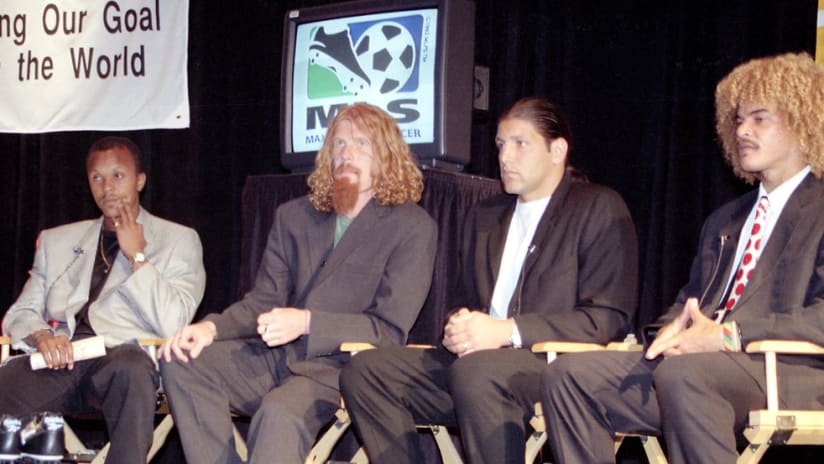
II. BUILDUP TO OPENING DAY
Paul Bravo (Current technical director, Colorado Rapids and former midfielder, San Jose Clash): We didn't know what to expect. What we did know was we were all soccer players. We were a true professional soccer league and a true professional soccer club and those initial days were really surreal for us because a lot of us grew up in that area watching the San Jose Earthquakes at Spartan Stadium [and] having played in the APSL final at Spartan Stadium. It was a culmination of trying to put together a career at a time when professional soccer wasn't really professional soccer.
Wynalda: There was a lot of complaining. We went down to San Diego to start our training camp and all we did was run. We ran and ran and ran some more. Guys like Michael Emenalo, who had come from Europe and who's now at Chelsea, [was] just constantly asking me: "What's going on? What are we doing? When are we going to play? When are we going to start really preparing?"
Tom Liner (former goalkeeper, San Jose Clash): The trainings [were] super competitive. We started at 6 o'clock every morning and really didn't get out of there until around 5 o'clock in the evening. We did a lot of running, a lot of conditioning. But it felt like we just had to have a team together in five or six weeks before the first game.
Arena: We still didn't have a practice field ready, any of that kind of stuff. It was kind of crazy. It was completely bizarre to be honest with you. I remember it snowing in D.C., so we obviously had a late snowstorm in March, and the week of that game we had a difficult time training because we didn't have the right facilities.
Dayak: The whole lead-up was amazing. That's kind of how it felt back then, just overwhelmingly surreal and kind of like, were we really in this? Were we really gonna do this? Was this thing really gonna take off? I don't think we realized how successful it was going to be at that time. We were just young players that wanted to just play ball.
Wynalda: Overall nobody really knew what was going on. We were trying to get through the day and the way it worked out is that when the first game was upon us we were like, "Oh crap, it's here, now what? Are we ready?" We weren't entirely sure.
Gulati: You had to worry about all the operational issues: Are the flights going to be on time? Are the teams going to get here? Are the uniforms going to be the right size? We were showing off on a relatively tight timetable as well as on a relatively tight budget and the one thing you can't control is what happens on the field.
One day [current MLS president] Mark [Abbott] walked into my office in L.A. – I don't know if he'd just come back from a trip with investors – and he was concerned. He walked into my office and said, "Listen: just assure me that the referees will be there right? In San Jose?" And I said, "Yeah Mark, that'll be fine."
Phil Schoen (broadcaster with BeIn Sports, former ESPN play-by-play announcer who called the inaugural match): At Spartan Stadium the lights were pretty much in front of the seats between the seats and the field. And when the cameras are sitting like 30 rows back in the stands and they're panning left and right you can actually see the light posts. The producer [at ESPN] was saying, "That's not gonna work. Because every single time the ball moves from here to there, there's going to be a flash of silver in between" What he had them do was to break out some green paint and paint the light post green so it blended in a little bit with the grass so it wouldn't be as noticeable for some of the camera shots.
Payne: Nobody really knew what they were doing, including the TV people for the league. We were kind of all groping in the dark together.
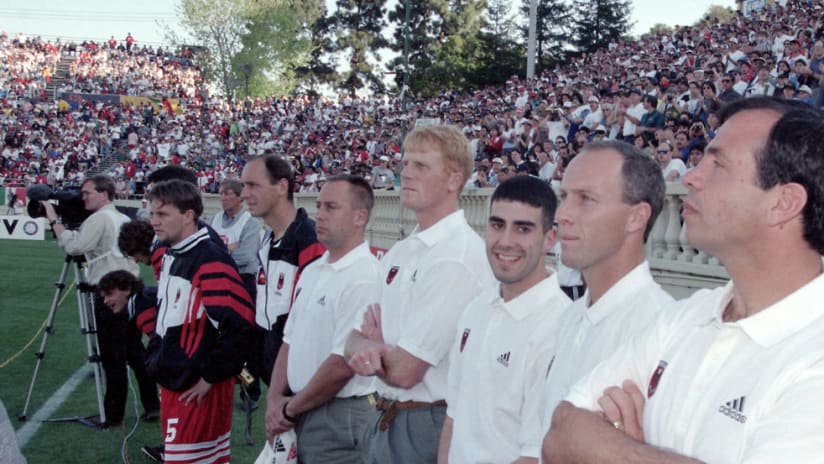
II. GAMEDAY
Schoen: When that day opened up, it was almost like a dream coming true. Just the vividness of the colors – the blue of the sky, the green of the grass – it just burned itself into my memory. To see everyone lined up for the opening presentation, all that pomp and circumstance, it felt like my heart was beating about 1,000 beats a minute and I could hardly wait for the game to start.
Wynalda: There were a lot of nervous people, especially on the bus on the way to the game. When we came around that last turn and saw all the people, and it was obvious it was going to be sold out, just a lot of nervous faces, you know? And my role was to just tell those guys, "Hey, trust yourself, you're going to be alright. You're a great player. You can do this. Just go out there and have fun."
Harkes: The first thing that I remember is saying, "Hey guys, enjoy this. Don't get tight." Because there was a lot of different levels of players playing in that game. You know, guys who hadn't been in that arena before, guys who hadn't played in front of a crowd that big and didn't know what to expect. So you knew that nerves were going to be there. Every chance I got I was always trying to keep guys calm and just allow them to focus on what we were doing, competing as players for a club, D.C. United.
Payne: The league made us play with black tops, red shorts, and white socks. In the history of D.C. United, the only time we wore that uniform combination was in that game, which I thought was a very odd way to start the league. As important as a kit is in our sport, to start right out with a combination that wasn't actually your kit made no sense to me.
Bravo: Sitting in the tunnel waiting to kick off I remember in front of me was Jeff Baicher and behind me was Tim Martin, guys I grew up in the area with. We kept looking back at each other like, "Is this really happening?" That's the thing that sticks with me the most: walking out on the field and seeing the crowd rise – a huge crowd – and understanding that this is something that we had all talked about as a pipe dream and now it was a reality.
Tim Martin (defender, San Jose Clash): I grew up watching the Earthquakes. I grew up watching George Best. My dad had season tickets. I was at that stadium when I was a kid in '84. When I walked down that ramp into the stadium it was kind of a surreal thing for me. I couldn't believe I was actually walking down that ramp which I had watched as a kid.
Schoen: On that particular day there was an anticipation, a hunger that this was finally going to be our league. And this was just not our day, but the start of our new reality. It was like being a soccer fan and finally being able to burst out of the closet and wear your jersey with pride.
Paul Holocher (former forward, San Jose Clash): I think it was almost a bit surreal for all of us that had played in the APSL and the USISL. You're kind of pinching yourself as you're walking off the field and seeing how big this thing was and how big the game was. I just really felt that soccer had really arrived in America at least in my generation.
John Doyle (Current Earthquakes general manager and former defender, San Jose Clash): It was just realizing a dream that soccer – in our minds at that point – had made it in America.
Schoen: It was almost a surreal experience as though while I am there calling the game, part of me is kind of floating above just witnessing everything come together. I've had the chance to do a World Cup. I've had the chance to do Clásicos. I've had the chance to broadcast Copa Américas. But there's something special about that day that will always be towards the top of my list.
Agoos: We were not playing in a foreign land. This was not a national team game. These were generally American players. We were being broadcast on American TV, on ESPN, which had never really happened before for domestic games. It was something very special and I think everyone on the field, everyone in the crowd, all of the players, all of the coaching staff, the officials, I think they all felt this same thing, this togetherness, that we were doing something special.
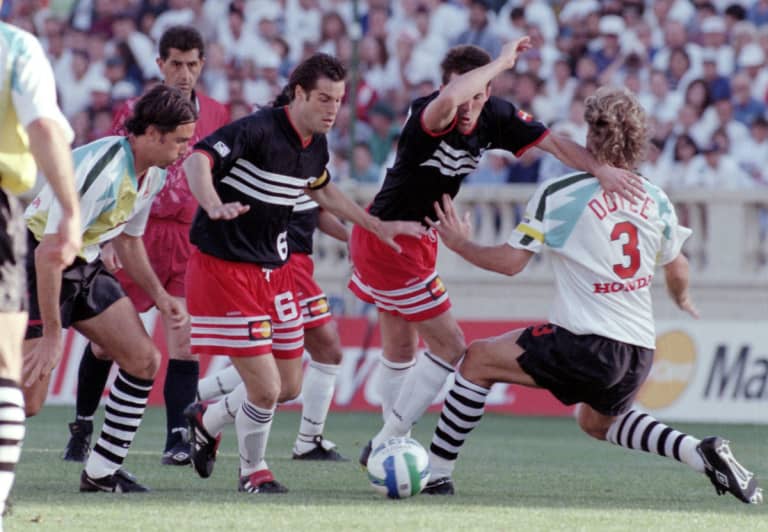
IV: FIRST KICK
Wynalda: If you go back and watch the first 20, 30 minutes of that opening game, everybody was nervous. It was a very odd game. It took a long time for it to calm down.
Schoen: It felt as though the players were almost being choked by the nerves and the anticipation and the pressure to perform on this historic day. A lot of them just didn't look comfortable. Maybe they were trying to play it safe. Maybe there were so many second thoughts.
Harkes: I can tell you that as much as we felt we were prepared, we probably weren't the best.
Gulati: It wasn't a great soccer game. There was a lot of kinks in the teams. It was the first game that many of them had ever played with each other in a regular season game, obviously.
Agoos: What I thought was a hard-fought, well-played game was actually a really, really poorly played game from a technical perspective. I think that it was very disjointed.
Arena: It was a terrible game.
Payne: It took awhile for us and for other teams to get our bearings and figure out how we were going to look like and how we were going to play.
Liner: We were put together from all areas of the world and we didn't have a style of play at that point in the season, so we were trying to figure ourselves out. I knew that we were talented enough, but people just didn't want to make a mistake.
Agoos: It was all sort of a blur. Everything happened so slow and so fast at the same time. The game, while it was 90 minutes, seemed like it only lasted 15 minutes. Everything was just sped up. Everything that happened before the game seemed so slow and we wanted to get to the game. Time just didn't tick by as fast as we would have liked it, but once we got in the game it just seemed to go so fast. It was just a very surreal event is the best way to describe it.
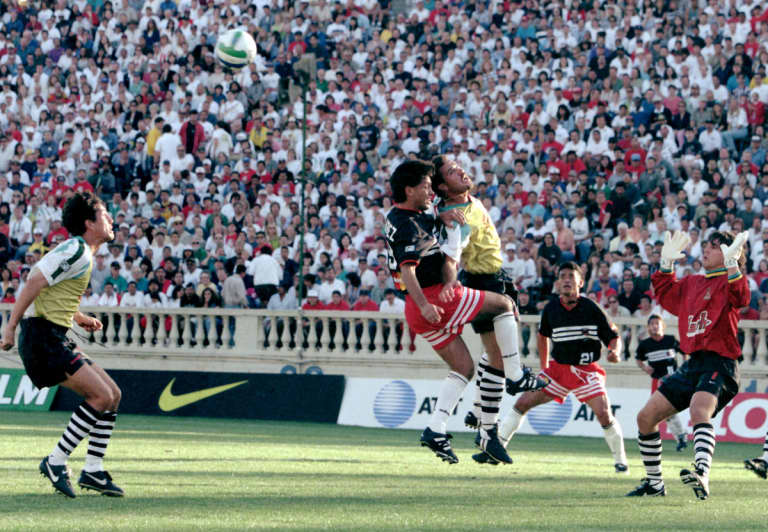
V: DEADLOCK
Schoen: More and more as the game progressed into the second half, there just seemed to be almost a melancholy that settled in that we were going to be destined to go through this historic game without a goal.
Martin: I felt it, being like: "Wow, we're going to be the opening game and we're not even going to score a goal at home? No one's going to score?" You know the stereotype of no goals [in soccer]. We're kind of giving the media what they normally want to rip about us. So there was tension. It was on people's minds that we can't tie or that we can't have no goals in this game. We almost felt like we were representing everybody in that game.
Agoos: Whether we won or lost, I just didn't want there to be a 0-0 tie. I just felt that it would have been a sort of an I-told-you-so moment for the U.S.-based sports fan because that was all we essentially got persecuted for: the games were not exciting, the games were low-scoring. Here at 0-0 in the late stages of the game, that was exactly what was happening. So I was afraid that was going to be the headline in the paper the next day. While I wish there had been a different ending and we'd won the game, I'm glad that there was an outcome that was different than a 0-0 [draw].
Payne: It didn't bother me, because I was from the game. I understood that ties and low-scoring games [are] part of the game. I think a lot of people at MLS were freaking out. The league had a pretty heavy hand in those days in the sense that there was this idea that we needed to somehow improve on this game that was the world's most popular pastime. I didn't want it to end in a tie, only because I didn't want to watch the shootout, which I opposed from day one.
Gulati: We wanted a goal for sure. We would have liked to have had a few.
In the 80th minute, Eric Wynalda one-timed a pass from midfielder Michael Emenalo. His shot bounced inches wide of United goalkeeper Jeff Causey's goal.
Wynalda: [It] was a great through ball from Michael Emenalo; [he] put me in a really good spot. It's not an excuse, it's a reality: the grass was longer than what I was used to and the ball just checked up on me and I missed it. I mean, I thought I had him. I know I had Causey leaning the wrong direction and I missed wide. I remember thinking, "Wow that was it, I'm not going to get another chance."
VI: THANK GOD FOR ERIC WYNALDA
Bravo: I think what people were thinking on the field – certainly I was – is, "Oh no, this would not be a great advert for the game for this game to end 0-0." No one on that field wanted it to end 0-0 and certainly we had one person who was willing to step up and make a great play and that catapulted our league.
Wynalda: Once the ball popped out of there and Ben [Iroha] got there first I was screaming at him to get me the ball because I had gotten myself into a really good starting point and I know Jeff [Agoos] really well. I remember just wanting the ball so bad from [Iroha] and thank God he passed it to me early because I had a lot of time to think about it. I knew exactly what I wanted to do.
Bravo: I was standing next to Marco Etcheverry and making sure that if [Wynalda] lost the ball I would be in a good position to be able to deal with any threat. I remember him picking the ball up. I remember him running at Agoos and I knew exactly what he was going to do because he does that to everybody in practice: sets them up, sticks the ball between the legs and finishes. So when he got that ball wide and started running at Jeff, you could feel and sense that something special was about to happen.
Agoos: I didn't want [Wynalda] to get a shot off at the end of the match, and so when I closed him down, I'd gone to essentially block the shot. To Eric's credit, I think he made a very smart move and put the ball between my legs.
Wynalda: The idea of putting [the ball] between [Agoos's] legs was a last second improvisation. Because he read the play really well. I think he was really unlucky on that because he has the biggest calves I've ever seen and somehow that ball went between [his legs] and to his credit he did everything right on that play. It's just I saw a little opening and saw, "Oh no, I didn't get past him and I want to get this ball back on my right foot, my last resort is to try and [nutmeg] him." And it went through.
Schoen: I didn't think he was going to be able to do it himself, but you kind of sensed that this was a moment that was really going to test that D.C. defense. And then when he just opened up and the ball left his foot and you could just see the trajectory. You saw where the defense was. You saw where the ‘keeper was. You saw where the net was. And just watching that ball kind of curve into the back of the net was the culmination to a dream goal.
Wynalda: We had had a preseason game down in San Diego against D.C. United and Causey was in the goal. I got isolated all alone with him and I tried to throw a hip move and just go upper corner on him to the near post and I missed. He laughed and winked at me and smiled as if to say, "What are you trying to do? That was a stupid."
The moment I got free from Agoos and I looked up, all of that flashed through my head. I remember thinking, "[Causey's] going to think I'm going to do it again. He doesn't know where to go." All of this went through my mind. My only thought was just to pass it in the goal. Far post, bend it around him, and pass it into the lower corner.
Agoos: I had less to do with that [goal] than Eric did. I give him more credit than I give myself.
Schoen: In shock and a beat or two too late, the stadium just erupted. It was just an outpouring of joy, frustration, celebration all rolled into one.
Doyle: You know what, I've seen it a million times and it's exciting every time I see it. I remember running over sliding, and [Wynalda] was on his knees, and hugging him and being so happy. But it happened so quick on the field and you're at the other end of the field, so I didn't have a great vantage point. When you see it on film it's great.
Liner: I was going to run up there and congratulate but I just remember thinking, "I run up there and they take a quick kickoff, the ball could end up in the net and I'd look like an idiot."
Agoos: I remember joking around with a couple players a few days after [that] I'd essentially saved the league from a 0-0 tie, which everyone would have hated to start the league.
Payne: Some of the league people were very happy that the game didn't end up 0-0. It was such a hostile media environment then. People today have a hard time remembering or understanding that 20 years ago, there was a lot of people in the sports-writing world that actively hated our game and wanted it to fail.
Gulati: It would have been a very bad message if the game had ended up 0-0 and we had to go to a shootout to settle it. [For] Eric – at the time the leading scorer for the US national team – to score a terrific goal late in the game was something that we couldn't have scripted. It was something that was very important, the result on the field.
Wynalda: That moment after was such a relief for so many reasons. I could watch it over and over again. But I don't watch the play, I watch the people and I watch my teammates because it was just such an enormous relief factor that that game didn't end 0-0. We got out of there with a win and a lot of attention to the league and an exciting finish which I think was really relevant. We didn't want to go to a shootout; we wanted the game to end in the way that it did, which was pretty phenomenal. If you really think about it, it was a pretty cool script.
Schoen: You could argue that Eric Wynalda has scored prettier goals, but considering the responsibility that he took, considering the creativity that he showed, and considering the significance of that goal, I'd be hard-pressed to say that he's scored a better one.
Gulati (speaking to media following the match): Thank God for Eric Wynalda.
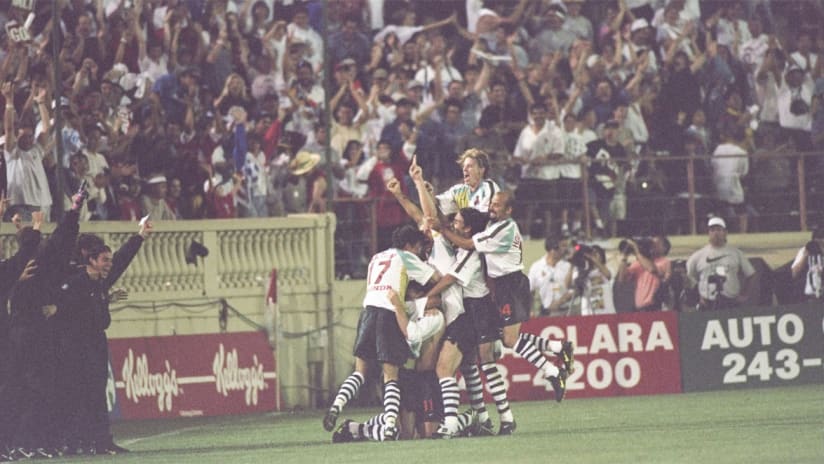
VII: THE LEGACY
Schoen: While there are no givens in this world, there are opportunities and this match between San Jose and D.C. on that day was an opportunity. It was an opportunity, I think, that was ultimately taken advantage of, that was achieved successfully by that one moment of brilliance. The fact that it ended so dramatically, so brilliantly, was a great launching pad. If it had ended differently, do I think MLS would have folded? No. But it was an opportunity and one that is worth remembering in the way that it all came about.
Calloway: It was the kick off of what was to be – what everybody hoped would be – a very successful league, which I think has been proven correct now.
Harkes: [The first game] was almost like a measuring stick for everybody. We learned a lot about ourselves then and it helped propel us on throughout the season and the coaching staff did an absolutely tremendous job of preparing us throughout the year and we got stronger and stronger and won the league.
Dayak: I still hear people today saying that they saw that inaugural game and that inspired them to watch soccer and get their kids into the sport. It inspired a whole community, it inspired a passion for the sport in our area in northern California, and it inspired the next generation to want to come and be a part of it.
Agoos: I had a lot of special moments on the field, with the clubs I've been able to play for in MLS and with the national team. But that was certainly one game that I'll always remember. Every journey starts with the first step and that was the first step, literally the first step. To believe that 20 years later we are where we are is incredible because the league that I see now is completely different from the league I entered as a player in 1996.
Payne: If you look at where the league is today, it's coast-to-coast, it's an increasing number of teams. There's competition to come into the league. Attendance is terrific and growing. I think people will look back on the beginning of MLS and say this is the moment when the game really got its new beginning in the United States.
Bravo: We grew up at a time where there wasn't Major League Soccer and we didn't know if it was going to last. To see where the league has grown to today, I look back on that day. I remember those emotions. I remember the game. I remember the result. But I also know how important that game was to launching what we are today.
Schoen: I think that the league has progressed so much to the point over the past quarter century or so that we almost take it for granted. But that first game, that first week, those opening days give you an idea as to how important the launch of this league was to so many soccer fans across the country. Now we take it for granted. Now we criticize. Now we critique. Which is great because that's what soccer fans do everywhere around the globe, but for so many years in the United States we had to do it from afar and now we had a league of our own.
Gulati: Getting started was absolutely essential to the league, but the real exhilaration frankly is seeing it 20 years later and where it is and how far it's come. The adrenaline on that day was I'm sure flowing and a lot of energy and excitement and all of that, but it's looking back at it and saying the true measure of success is not that we got the league started. The true measure of success is that the league is there: solid, stable, growing, and an absolutely important part of a landscape 20 years later.

